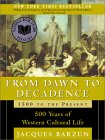Summary | Excerpt | Reviews | Readalikes | Genres & Themes | Author Bio

Critics' Opinion:
Readers' Opinion:
First Published:
May 2000, 896 pages
Paperback:
May 2001, 896 pages
The West Torn Apart
The Modern Era begins, characteristically, with a revolution. It is commonly called the Protestant Reformation, but the train of events starting early in the 16C and ending - if indeed it has ended - more than a century later has all the features of a revolution. I take these to be: the violent transfer of power and property in the name of an idea.
We have got into the habit of calling too many things revolutions. Given a new device or practice that changes our homely habits, we exclaim: "revolutionary!" But revolutions change more than personal habits or a widespread practice. They give culture a new face. Between the great upheaval of the 1500s and the present, only three later ones are of the same order. True, the history books give the name to a dozen or more such violent events, but in these uprisings it was only the violence that was great. They were but local aftershocks of one or other of the four main quakes: the 16C religious revolution; the 17C monarchical revolution; the liberal, individualist "French" revolution that straddles the 18th and 19th; and the 20C "Russian," social and collectivist.
The quotation marks around French and Russian are meant to show that those names are only conventional. The whole western world was brooding over the idea of each before it exploded into war, and the usual dates 1789 and 1917 mark only the trigger incidents. It took decades for the four to work out their first intention and side effects - and their ruling ideas have not ceased to act.
One must speak of the West as being torn apart in the 16C because Europe would be inexact. Europe is the peninsula that juts out from the great mass of Asia without a break and is ridiculously called a continent. In the 16C revolution only the westernmost part of that peninsula was affected: from Germany, Poland, Austria, and Italy to the Atlantic Ocean. The Balkans belonged to the Moslem Turks and Russia was Orthodox Christian, not Catholic. For the West, in this clearly defined sense, it would be convenient to say "the Occident."
To call the first of the four revolutions religious is also inadequate. It did indeed cause millions to change the forms of their worship and the conception of their destiny. But it did much besides. It posed the issue of diversity of opinion as well as of faith. It fostered new feelings of nationhood. It raised the status of the vernacular languages. It changed attitudes toward work, art, and human failings. It deprived the West of its ancestral sense of unity and common descent. Lastly but less immediately, by emigration to the new world overseas, it brought an extraordinary enlargement of the meaning of West and the power of its civilization.
When the miner's son from Saxony, Luther, Lhuder, Lutter, or Lotharius as he was variously known, posted his 95 propositions on the door of All Saints' church at Wittenberg on October 31, 1517, the last thing he wanted to do was to break up his church, the Catholic (= "universal"), and divide his world into warring camps.
Nor was he performing an unusual act. He was a monk and professor of theology at the newly founded university of Wittenberg (where Hamlet later studied), and it was common practice for clerics to start a debate in this fashion. The equivalent today would be to publish a provocative article in a learned journal. A German scholar has recently argued that Luther never posted his theses. Whether he did or not, they circulated quickly; he had made copies and sent them to friends, who recopied and passed them on. Soon, Luther had the uneasy surprise of receiving them back from South Germany, printed.
This little fact is telling. Luther's hope of reform might have foundered like many others of the previous 200 years, had it not been for the invention of printing. Gutenberg's movable type, already in use for some 40 years, was the physical instrument that tore the West asunder. But one point about the new technic is worth noting: the printing press by itself was not enough: better paper, a modified ink, and a body of experienced craftsmen were also needed to make type a power. Pamphlets could now be produced quickly, accurately, in quantity, and, compared to manuscript copies, cheaply.
Copyright © 1999 by Jacques Barzun. All rights reserved. Published by permission of the publisher, Harper Collins. This excerpt, or any parts thereof, may not be reproduced in any form without permission.





The Flower Sisters
by Michelle Collins Anderson
From the new Fannie Flagg of the Ozarks, a richly-woven story of family, forgiveness, and reinvention.

The House on Biscayne Bay
by Chanel Cleeton
As death stalks a gothic mansion in Miami, the lives of two women intertwine as the past and present collide.

The Funeral Cryer by Wenyan Lu
Debut novelist Wenyan Lu brings us this witty yet profound story about one woman's midlife reawakening in contemporary rural China.
Your guide toexceptional books
BookBrowse seeks out and recommends the best in contemporary fiction and nonfiction—books that not only engage and entertain but also deepen our understanding of ourselves and the world around us.